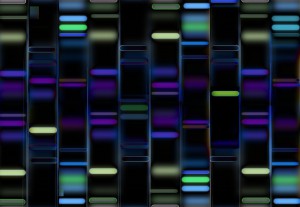 With October in full swing, Breast Cancer Awareness Month is underway to highlight the importance of breast cancer prevention, early detection and prompt treatment. Understanding the risk factors for breast cancer is key for prevention, and in BMC Medicine we take a look at how genetic and environmental factors contribute to the chance of developing the disease.
With October in full swing, Breast Cancer Awareness Month is underway to highlight the importance of breast cancer prevention, early detection and prompt treatment. Understanding the risk factors for breast cancer is key for prevention, and in BMC Medicine we take a look at how genetic and environmental factors contribute to the chance of developing the disease.
Can disease risk genes be modified by environmental factors?
While a number of validated genes are known to confer breast cancer risk, increasing evidence suggests that certain behavioral factors, such as alcohol consumption and smoking, are thought to modify the effect of genetic risk markers. In a commentary article published as part of our Spotlight on breast cancer article collection, Olivia Fletcher and Frank Dudbridge discuss recent progress in elucidating gene-environment interactions in breast cancer risk.
The authors describe several large-scale studies – including the Million Women Study and the Breast Cancer Association Consortium – which have shed light on how environmental factors can modify genetic risk for breast cancer. Although studies such as these have identified significant gene-environment interactions, for example between the CASP8-rs1045485 gene polymorphism and alcohol consumption, Fletcher and Dudbridge explain that the majority of interactions require replication:
“It is currently too soon to tell whether GxE interactions will shed light on disease processes and improve the accuracy of epidemiological risk models…[we] need to replicate or refute the reported interactions, identify the causal variants that underlie tag-SNP associations and validate the next generation of epidemiological risk models”
Ongoing large, prospective studies such as Breakthrough Generations aim to shed further light on the genetic and environmental causes of breast cancer, and should help to validate previously identified gene-environment interactions.
Do genetic breast cancer subtypes have clinical value?
 While elucidating the complex genetic and environmental causes should help prevent breast cancer in the future, understanding the molecular tumor subtypes in those affected could help facilitate prompt and effective treatment.
While elucidating the complex genetic and environmental causes should help prevent breast cancer in the future, understanding the molecular tumor subtypes in those affected could help facilitate prompt and effective treatment.
In a Biome magazine podcast, BMC Medicine’s Editorial Board Member Debu Tripathy from MD Anderson Cancer Center outlines gene-based assays that are used in the clinic for defining molecular cancer subtypes, and discusses some genetic alterations that can be targeted with currently available drugs. However, as discussed by Tripathy and Mark Robson, many genetic abnormalities do not represent druggable targets, and in most cases, the value of next-generation sequencing is in clinical research.
The use of next-generation sequencing in the breast cancer clinic remains highly controversial, and is debated by Kimberly Blackwell and Mark Robson in our forum article. Looking to the future, Tripathy explains that:
“[what becomes standard care in the future] depends on how the field evolves in terms of what drugs are available [as well as] which genetic changes are the most actionable and have the biggest clinical impact when we target them with these drugs”
Although at present it is too early to tell whether tumor molecular profiling will have great clinical value, and whether gene-environment interactions have a reproducible impact on breast cancer risk, current results point towards a promising future. Further research should provide additional insights into the contribution of gene-environment interactions to breast cancer prevention, as well as whether molecular profiling can help guide effective treatment, in the continued fight against breast cancer.
BMC Medicine’s Spotlight on breast cancer article collection is now open for research submissions. The collection aims to highlight the latest progress across all areas of breast cancer medicine, including clinical studies of new therapies, molecular genomics and translational advances. If you have any research you would like us to consider for inclusion in this article collection, please email bmcmedicineeditorial@biomedcentral.com.
 BMC Medicine: passionate about quality, transparency and clinical impact
BMC Medicine: passionate about quality, transparency and clinical impact
2013 median turnover times: initial decision three days; decision after peer review 51 days
Comments